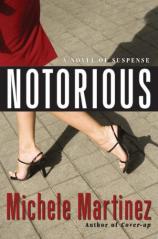Interview: February 29, 2008
February 29, 2008
Former lawyer turned suspense/thriller author Michele Martinez has written four novels --- including the newly released NOTORIOUS --- that revolve around Melanie Vargas, a New York City prosecutor who specializes in narcotics-related crimes.
In this interview with Bookreporter.com’s Joe Hartlaub, Martinez explains how heavily this latest book was influenced by her real-life experiences and ponders the future of her protagonist, who may not make an appearance in her next novel. She also shares her recent literary discoveries, offers advice to struggling first-time authors and briefly discusses her return to the legal profession.
Bookreporter.com: In NOTORIOUS, your new Melanie Vargas novel, Melanie is preparing to prosecute Atari Briggs, a very high-profile rap artist, for ordering a murder. One of the pivotal moments of the book takes place when Melanie begins listening to one of Atari’s CDs for potential clues concerning the murder, as well as other crimes. What inspired your use of a rapper as a prosecutorial target for Melanie in NOTORIOUS? Have you been a fan of rap music? And, given the controversy surrounding the music, do you think it encourages more violence?
Michele Martinez: The choice of a rapper-defendant comes directly from my personal experience as a narcotics prosecutor in New York in the '90s. I prosecuted a fair number of guys who were pretty high-level in the narcotics trade while also pursuing hip-hop music careers. I literally had defense lawyers ask me to listen to their clients' demos, as if the fact that a person was a serious musician would somehow change the evidence in the case! In short, a decent number of the musicians whose work lays claim to insider knowledge about drugs, violence and murders aren't lying. Rap comes from the streets, which is what gives the best rap music its power and authenticity. (And yes, I like a lot of this music.) Does it encourage violence? It certainly glorifies it, but then, so does much of today's art, including film and video games.
BRC: One of the more interesting, and subtle, subplots in NOTORIOUS centers on the double lives that some of the characters --- defense attorneys, defendants and at least one federal prosecutor --- lead during the course of the novel. It makes for an interesting contrast throughout the book, taking it in intriguing directions. Did you begin writing NOTORIOUS with the idea in mind, or did it develop gradually as you were writing?
MM: The double life was planned for a couple of the characters you mentioned, but for the third, well, he surprised me as much as he surprised Melanie. (Hmm, not sure I can fully answer this question without getting into plot spoilers!) I wanted to explore the concept of double lives because the world of criminal law holds so much temptation, even for the "good guys." The "cartel lawyer" character featured in NOTORIOUS is a member of the bar, sworn to uphold the law, but can't resist the vast sums of money to be made by getting too involved with his drug dealer clients. Does this happen in real life? You bet! Certain vignettes about that character were directly inspired by things I saw as a prosecutor.
BRC: One of the most consistently enjoyable elements of your work in general and of NOTORIOUS in particular is the role played by office politics, particularly at the federal level, and the way that support staff is often the tail that wags the dog. How much of your own office experience informs what Melanie Vargas encounters in your novels?
MM: All of that stuff comes from my experience in a real-life prosecutor's office. Awareness of office politics is one of the things that I, as a former prosecutor in real life, can bring to my readers. Office politics is just a huge part of the working world. To me, fiction set in the workplace can't be authentic without at least some reference to it. Besides, it's a lot of fun to write (and read) about, being both humorous and down and dirty. The way that characters do (or don't) play politics can also reveal a great deal about who they are that wouldn't necessarily come out in other ways.
BRC: Another interesting, albeit minor, development in Vargas’s life in NOTORIOUS is the plan for her sister and mother to move to Miami. While there are elements in her life that would seem to mitigate against it, do you foresee Vargas leaving New York --- and possibly the federal prosecutor’s office --- in the future?
MM: You're right on --- I was toying with possible scenarios for Melanie's future as I wrote this book. She's not entirely happy during NOTORIOUS. Some major elements of her life are awry. Yet, by the end, I think she has found peace again and come to terms with the fact that she loves her crazy job despite how difficult it makes her life.
BRC: A small but very important part of NOTORIOUS is set in Las Vegas. Did you travel there to do research for that portion of the novel, or were you there and decided to incorporate it as a backdrop for it?
MM: I planned to do research during a trip to Vegas. It's just such a perfect setting for crime, isn't it?
BRC: Evan Diamond, the defense attorney for Atari Briggs in NOTORIOUS, was quite a character. In your own practice, did you ever encounter an attorney, on either side of the courtroom, who set such a low bar in ethical standards?
MM: In a word, yes.
BRC: On a related note, your characters always seem to be very realistic. I especially felt that way about Jennifer Lamont, who plays a pivotal, if tragic, role in NOTORIOUS. The episode involving Jennifer had the ring of truth to it. Did this spring entirely from your imagination, or were names changed to protect the guilty and innocent?
MM: Wow, your questions are showing me how much I drew on real-life experience in this book. I will say this much: there was a "notorious" incident that made the rounds of the office grapevine back in my day involving a female prosecutor and a rather shady male defense attorney. I've always thought that this incident would make an interesting subject for fiction. But in all fiction, the real-life kernel of inspiration ends up morphing into something completely different and independent. That happened here, so that what ends up on the page barely resembles its original inspiration. But do these general sorts of scenarios occur in real life? Yes. Rarely, but yes.
BRC: What are you working on now? Do you ever feel any urge to write about someone other than Melanie Vargas, or to perhaps focus on one of your other characters who recur in her books?
MM: Absolutely, and I am. I'm currently writing a stand-alone that bears little resemblance to the Melanie Vargas books, save for the fact that it's set in the world of the violent narcotics trade in New York City -- a world I know well.
BRC: Does your current writing schedule vary in any way from what you were doing when you first started writing? Does the writing get harder or easier? Have you changed anything in terms of how you conceptualize a prospective work?
MM: Honestly, I think the writing gets harder. It certainly gets more self-conscious. You get reviewed a lot. You meet a lot of talented authors and read their stuff and feel inadequate. It's hard to put aside all the white noise and focus on your own work. The only way I know to do that is to get sufficiently into the plot of a new book so that it takes over my brain. Luckily, that's happening now with my stand-alone. Sometimes it's hard to talk to people because I'm so in the book. I look like I'm here, but mentally I'm not; I'm with my protagonist, whose life is so much more compelling and dramatic than mine.
BRC: You balanced a legal career, as well as duties as a spouse and parent, while becoming established as an author. What advice would you give to those who are struggling to finish their first novel?
MM: You have to love doing it for its own sake. Otherwise, it will be very difficult to carve out the time.
BRC: What books have you read in the past six months that you would care to recommend to our readers?
MM: I've been totally absorbed in Diana Gabaldon's Outlanderseries. I'd call these books adventure sagas with elements of historical romance, and yes, time travel. I never thought I'd be able to love books that included time travel, but there are some truly extraordinary elements in them. The main relationship (between Claire Randall of the 20th century and Jamie Fraser of the 18th) is so flesh-and-blood real that I can't stop reading about them. (And the sex is great!) Plus, the details of everyday life in Scotland and America during the 1700s are rendered with such breathtaking clarity that I feel truly swept away.
BRC: If you weren’t writing, what would you be doing? Do you have any desire to go back to a legal career? And, if so, would you want to return to a prosecutor’s office on some level or do defense work?
MM: Yes, I miss law a lot and I'm going to be returning to it part-time, teaching a criminal law class.
BRC: Finally --- and trust me, I am sure I am not the only one who is curious about this --- who is on the cover of NOTORIOUS?
MM: That's Melanie Vargas! Nice gams, huh?




